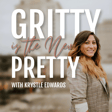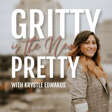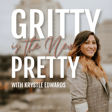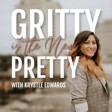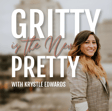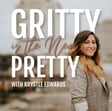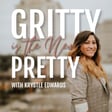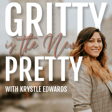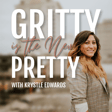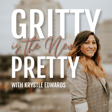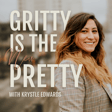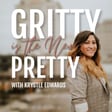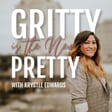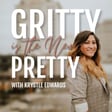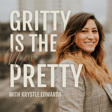Become a Creator today!Start creating today - Share your story with the world!
Start for free
00:00:00
00:00:01

12: Erica Chang, Tacoma Local & Yoga Extraordinaire
Grit and Grind podcast is brought to you by Grit City Women - A female forward organization that nurtures a creative approach to empowering female entrepreneurs, small business owners, and leaders in Tacoma.
Join host Krystle Edwards and Erica Change, Tacoma local and Yoga extraordinaire as we discuss Erica's journey to finding her sweet spot in life.
Learn more about Erica:
Join host Krystle Edwards and Erica Change, Tacoma local and Yoga extraordinaire as we discuss Erica's journey to finding her sweet spot in life.
- Being comfortable with being uncomfortable
- Benefits of Yoga
- Importance of tansitions
- Being ok with bad days!
Learn more about Erica:
- Instagram: ericachang_
- Take a class!
Edgeworks Climbing
Tacoma Yoga
Yoga Wild https://www.youtube.com/c/yogawild and https://ywondemand.com/
Transcript
Introduction to Grit & Grind Podcast
00:00:03
Speaker
Welcome to Grit & Grind, a podcast by Grit City Women, where gritty is the new pretty. Grit City Women is empowered by Melissa Newell, Edward Jones Financial Advisor, and Columbia Bank.
Erica Chang's Journey to Tacoma
00:00:18
Speaker
On episode 12, Grit & Grind, we have Erica Chang, Tacoma local and yoga extraordinaire.
00:00:33
Speaker
Hi, Erica. Hi, how are you? Good. How are you? Well, thanks for having me today. Absolutely. Thank you for being here. Why don't you go ahead and start off by telling us a little bit about yourself? Sure. My name is Erica. I use the pronouns she, her. I have been in Tacoma for a little over
00:00:58
Speaker
Oh gosh, six years. Um, I recently bought a house because I think Tacoma is where I want to be for a little bit longer. I have spent a good chunk of my adult life moving from place to place, not really being grounded.
Yoga Behind Bars and Restorative Justice
00:01:11
Speaker
Um, and I think what grounds me in Tacoma is my yoga community. I teach at several places, um, edge works, yoga wild, and a studio called Tulidara. And I also have experience teaching for yoga behind bars.
00:01:29
Speaker
Tell us about Yoga Behind Bars. Yeah, so Yoga Behind Bars is an organization that reimagines the criminal justice system. So they advocate for restorative justice solutions, holistic reentry services, and the removal of barriers that prevents formerly incarcerated individuals to rebuild their lives upon release.
00:01:56
Speaker
So one of the ways that yoga can help is learning new ways on how to navigate, being more present, learning about our bodies and how we react to situations. I received a scholarship when I was doing yoga teacher training for yoga behind bars. So I was able to do their training and learn not only about the criminal justice system and the obstacles that it prevents, but how yoga is a tool
00:02:26
Speaker
that these individuals can use on reacclimating back into society.
Teaching Yoga in Non-Traditional Settings
00:02:33
Speaker
And I taught yoga at Raymond Hall to incarcerated youth. I would go there once or twice a week and not only learn about who they are, but provide yoga to them and giving them tools and meditation tools that they can use while they were there.
00:02:56
Speaker
What was that experience like for you? Yeah, so it's a very different experience than being in a traditional yoga studio. I had to be aware of how I was dressing, so I wasn't wearing traditional yoga clothes. I didn't have any jewelry or any makeup just because that shows or that would have demonstrated that
00:03:23
Speaker
like a superior model when I just wanted to understand who they were. And it's also part of the yoga behind bars program as well. Like once someone sees you at the same level or I guess stripped down, they're able to identify with you a little bit better than if you were coming in wearing a business suit, telling them about tools that they don't really understand. Right.
Expanding Yoga Behind Bars Across Washington
00:03:50
Speaker
How long did you do that for?
00:03:52
Speaker
that for about two years. Wow. Did you notice a difference in some of your students that you work with? Yeah, I at first it was interesting because it's always interesting introducing yoga to someone who doesn't know much about it. Like are we if they're saying I'm not flexible enough or I don't know how to meditate or this is not the thing for me.
00:04:22
Speaker
There are different types of styles of yoga that can be presented. So I typically teach Vinyasa flow classes. I can teach a slower class. I can teach a meditation class. So being able to learn how to be adaptable to what these youth were needing. Sometimes they were really interested in arm balances because it shows them the strength that they have in their bodies and they can stand on their hands, which is awesome.
00:04:49
Speaker
at the same time, like being able to be in Shavasana and just lay there and noticing their heart beating and noticing their breath is also really powerful as well. So I think those were the things that I was able to notice while I was teaching there. Does the program primarily only operate with youth or does it work with adults as well?
00:05:14
Speaker
It also works with adults, so there are a group of teachers that I know that have taught yoga at Purdue in the gay carver area, the Kitsap Peninsula, and then there are also teachers who are teaching in jails and prisons in the Seattle area.
Rehabilitation and Reintegration Tools
00:05:31
Speaker
Currently, I know that they expanded, so they expanded to Eastern Washington as well.
00:05:37
Speaker
That's such an incredible program. I love that. I think that we should be doing more to give some of these people tools, especially if we want them to rehabilitate and come back into society and manage some of the things they're gonna have to go through, because they're already going to have an even bigger obstacle than they had before, because now they may have a record, now they have,
00:06:05
Speaker
to get their life back together and rebuild. And I can't even imagine how challenging that can be. And so providing them tools like that to just de-stress and decompress and then give them something to look forward to, I think that is really incredible. So thank you for doing that work.
Yoga Behind Bars Online Presence
00:06:27
Speaker
And if people want to learn more about Yoga Behind Bars, is there a website that they can go to?
00:06:36
Speaker
Is it just yoga? So it's called yoga behind bars.org.org. Okay. You got it.
Passion for Yoga and Community Building
00:06:42
Speaker
Cool. So, um, let's talk about some of the benefits of yoga. I think we've touched on a lot of them through just this conversation, but you teach it so many different places. Uh, tell me why, why you're so passionate about it and what it can bring to the community.
00:07:02
Speaker
Yeah, so I got into yoga when I was going to grad school in San Francisco. I was studying trauma studies and focusing on memoir and testimony. So I was really interested on how we can preserve a testimony or a narrative from a second or third generation perspective. I took a Holocaust class and I was reading all of these books. I was just like, what are we doing?
00:07:29
Speaker
to preserve these narratives because they are important. Survivors are unfortunately like their stories are getting lost because there has been so much time since the event or they are dying, which is really unfortunate. So I was reading all this heavy stuff and I took a yoga class and I just fell in love with it. What the teacher was saying resonated with me, being able to notice my breath
00:07:59
Speaker
body as I was moving from pose to pose and also noticing the transitions. So I think sometimes there are a lot of individuals who think like the poses are really important, but there's so much more that goes into it. There is noticing your breath and how you're reacting to certain situations, being comfortable with being uncomfortable.
Yoga's Lessons on Acceptance and Adaptability
00:08:25
Speaker
That's like a life lesson too, being comfortable with being uncomfortable. Exactly, yeah. I talk about that a lot in just my conversations about growth and leadership and it's so hard to fight that feeling of
00:08:49
Speaker
accepting being uncomfortable. I mean, you know, like where you're like, Oh, I don't really want to do that because I'm uncomfortable. Or it's sort of like that circular thought process of I don't want to go to the gym because I'm embarrassed to have how I look. Right. Right. So it's like, there's those kind of that situation. It's like, well, what comes first, the chicken or the egg? And, you know, you just have to be comfortable with being uncomfortable, you know, and I feel like
00:09:19
Speaker
at one point in my life, I just saw a bunch of fire trucks. I don't know what's going on. I realized that that was going to be a benefit. And so I think it's so interesting that I never thought about the transitions and how those are just as important as the pose, because I think we think about
00:09:43
Speaker
Uh, okay. This is where I'm at. This
Yoga and Personal Growth through Transitions
00:09:46
Speaker
is my goal. This is my title, or I've got this job or, you know, I reached goal, but that transition and that learning and that growth and that struggle is really what information you carry with you as you progress through that next stage. I mean, and so I find that I love that because.
00:10:12
Speaker
if you can practice the transitions of being uncomfortable and maybe not being as steady in your pose and practicing. I mean, that translates completely to life, just in a physical aspect. Exactly. And I also think yoga is a practice, right? Like we're not trying to be better. Like some days you might feel different being on the mat. Like my down dog this morning is not the same down dog that it was last week.
00:10:42
Speaker
And I'm okay with that, right? I think sometimes we get a little competitive and I had to unlearn how to do that because I'm like, I always want to do well. I always want to succeed. And if I'm falling out of a pose, I also know that's part of life. Like I have to adjust to what is being thrown my way and being able to pick myself back up and say like, I can try this again. I might not get it today, maybe tomorrow.
00:11:11
Speaker
Yeah. And I think that I can imagine that that's a very slow way to think about it. You know, when I think about sometimes my mind and how I'm always a project person wanting to do things, I'm like, Oh, I messed that up, but I need to keep going. I need to keep going. And I think that's something that I need to work on. And I think that some people, especially women, business owners and entrepreneurs, like,
00:11:39
Speaker
Every day is not going to be the same. You know, you're not going to always get it right. Or you might've done well one day and this day you're not doing so great. But to slow down and give yourself that space like you would in yoga, where you're like, okay, like I'm still going through this really smooth, slow, methodical transition to the poses. And now I realize today's not a good day.
00:12:09
Speaker
I'm okay. I'm going to finish out what I'm doing and take a breath. And then tomorrow's going to be a new day instead of like, how can I fix it? How can I correct it?
Yoga and Rock Climbing Synergy
00:12:17
Speaker
How can I, you know, you know, and I think that exhausting. It is. Yeah.
00:12:31
Speaker
I think there's so many metaphors in life that yoga actually can really bring to the table. And those are things that I've never really thought of. And it makes me more interested in trying yoga now, because I can take those physical processes and relate them to how I'm feeling mentally. I'm a doer, but that's awesome. So how can yoga, you teach at EdgeWorks,
00:13:00
Speaker
Tell me about that program and how that affects climbing. Yeah. So Edgeworks is a rock climbing gym that's in Tacoma, Washington. Yoga is a service that they offer their clients. And the classes that I teach are advanced vinyasa and then intermediate yoga. So we tend to focus on breath to movement.
00:13:27
Speaker
Each time you're inhaling, you're moving, each time you're exhaling, you're moving. And it's also teaching them on students on how they can build strength and different techniques so they can apply them when they climb. A lot of the times in my classes, I focus on core work. I focus a lot on legs and hips because when you're climbing on the wall, you do have to turn. How can you use your body in a methodical way to help you
00:13:57
Speaker
as you climb different routes, not only inside the gym, but outside as well. Are you a rock climber? I dabble in it. So I do have the equipment. I just love yoga a lot more. My old roommate, she gave me her old climbing equipment and like, all right, that's great. And I've been a couple of times, but I'm like, yeah, I just love yoga so much more. Both are great. I do want to say that. They're awesome. Yeah.
00:14:28
Speaker
Yeah, I, you know, I did it with my friend Liz and that's how I got into it. And I really liked climbing because it really got me out of my comfort zone. Like I was terrified and I'm still terrified of it. But even just doing some of the basic routes for me, I don't have
00:14:53
Speaker
the typical body type that you would think a rock climber would have. So I never thought I could actually do it.
00:15:00
Speaker
But I can, you know, um, it's really just mental. And of course, physical fitness does impact your, your, um, ability to do it at different levels, but, um, I enjoy doing it for fun. And we used to always do girls trips and with our other friend, Lacey and go climbing. And those were like the best trips because we weren't, none of us were trying to like get after it or prove anything, you know, like.
00:15:29
Speaker
We're super gnarly and, you know, do all this. We were just doing it for the camaraderie and to be outside. And so I really miss those days, but maybe one day we can do a girls climbing trip and get a couple of women together and go somewhere and just do a super chill climbing route day. That would be fun. Yeah, that's awesome. Yeah, nothing crazy, though.
00:15:55
Speaker
I know, I know. I'm like a 5'8", 5'9", and then anything else higher than it, my bad. I don't know right now. I'm like 5'8". I'm like, yeah, that's probably pretty good for me. And if I'm having a good time. And climbing is similar to yoga because
00:16:11
Speaker
There were some days where mentally I do so well climbing, you know, and then there's some days where like my anxiousness for it is a little higher. And that blocks me from getting to the top of the route because I'm like, Oh, I can't make that move or da, da, da, da, da. And so it's like my own narrative is holding me back, but some days are better than others.
Yoga Wild and Social Justice
00:16:35
Speaker
And I think that can be very similar to some of the struggles with yoga. Um,
00:16:41
Speaker
Every day is different. Every day is different. Every route is different. Every class is different. So how do you react or respond to those things, knowing that it's teaching you how the areas that you could grow in. Right. Tell me about your work with Yoga Wild. Yeah. So with Yoga Wild, my friend Casey and Kelsey started
00:17:09
Speaker
that business and they are just great phenomenal women. They started Yoga Wild because it is a yoga organization that is quite different than any other yoga studio that I've seen in quite some time. So they focus on social justice, diversity, equity, inclusion,
00:17:32
Speaker
Um, they also do a lot of things for the community. So they'll host events or partner with different organizations. I know that they've partnered with y'all in the past. So that's awesome. They also like focus a lot on nature. Um, and they promote how not only we can take care of ourselves, but our community as well.
Yoga Wild's Pandemic Adaptations
00:17:54
Speaker
Yeah. That was one of their first tires. And the first class that I taught was outside the Foss Waterway Museum. And I've never taught an outside
00:18:03
Speaker
class at that time. So there were boats going by and there was traffic. It was windy. I also think it started raining. And what that particular experience taught me was, all right, like sometimes there are things that we can't control. Like, how do we respond to that? How do we give in and know that we're doing our best? Yeah. Are they teaching classes outside currently?
00:18:31
Speaker
I think their plan is to the summer. I know when they first started, they were doing classes on the rooftop of Alma Mater, outside the Foss Waterway Museum. They have classes at the Nature Center and also classes at Wapato Park. But because of the pandemic, their teachers are just filming classes and their classes are on yoga on demand.
00:19:00
Speaker
I've seen some of their videos and it's, they've done a great job of pivoting to the virtual platform during this time. And I think that's really incredible.
Teaching English in Korea
00:19:09
Speaker
They're very talented, a group of women running yoga wild and I'm very impressed with them and I'm really excited. Hopefully I can do one of the outside classes this summer. I would love that. I think that would be really fun. I'm missing the sunshine. Me too.
00:19:29
Speaker
You also studied in Korea, right? I did. Tell us about that and what you studied and what that experience was like. So I went to college in Eastern Washington. So I graduated there and I thought I wanted to be an English teacher. Like I studied creative writing and English and I didn't want to get my master's quite yet because I wasn't quite sure.
00:19:57
Speaker
So I moved to Korea, not knowing anything about the culture at all, to teach English at a private school. So I worked with elementary students and middle school students. Because I didn't know anything about their culture, I was taking Korean classes to learn about their culture because I wasn't introduced to this. I think sometimes with Asian history, it kind of gets glossed over in the States.
00:20:27
Speaker
So being able to understand these events and how each culture has something, and it's so valuable. And when I came back, I moved to San Francisco for grad school, and I was just blown away by what I was learning. And I think I've chosen to put myself in places where I'm also learning.
Language Learning and Cultural Navigation
00:20:51
Speaker
I don't like being complacent.
00:20:55
Speaker
But like I mentioned, I think Tacoma is good for me right now because I'm still continuing to learn and be in communities where that inspire me. That must have been kind of scary, I imagine, going to a different country to study. Yeah, like I said, I didn't know anything. And I didn't know if anyone was going to speak English. I didn't know how I was going to get from place to place.
00:21:25
Speaker
Yeah, and I just read like three months in. I was just like, I already know how to read the alphabet. I know how to get around and know how to ask questions. I couldn't have a conversation quite yet, but I was able to pick up words. So that was awesome. That's actually really incredible that you were able to pick that up that fast. I feel like that's fast. I've always struggled with other languages.
00:21:50
Speaker
and stuff like that. And when I traveled, you don't really realize how difficult it is until you're in a culture where their alphabet and their writing is different.
Academic and Career Path
00:22:02
Speaker
So like if you go to Mexico or to most of Europe, they still use the alphabet, the ABC. And so you're able to read it and then try to repeat it.
00:22:20
Speaker
But like when I went to Greece, they have the Greek alphabet. And I didn't even think about that. Oh my God, I can't read any of these signs. I don't know where I'm going. I don't know what I'm doing.
00:22:35
Speaker
I know it didn't cross my mind because I had never been to anywhere yet in my life where the actual writing and the alphabet was completely different. And then I ended up going to a few more places and I'm like, man, this is harder than you would normally think. But that's cool. I think that's awesome that you went over there and you really embraced it. And you took classes to learn about the culture. That's really cool. I was going to ask, how did you get from
00:23:05
Speaker
were wanting to be an English teacher, thinking that you were going to go into that field to where you are now, where you have a full-time job, and then you're very involved in the yoga community in Tacoma. How did that journey play out? Yeah, so I, after Korea, I liked teaching, but I wasn't entirely sure that was something that I wanted to do. So I went to grad school in San Francisco and I thought,
00:23:34
Speaker
I wanted to study post-colonial literature and maybe like try this on again, like maybe teach at a high school or a university. And then I took a Holocaust studies class and like, oh, no, I'm going to shift over here. And at that time I had a job at the school's career center, so helping students find jobs after they graduate. And living at San Francisco at that time,
00:24:01
Speaker
was challenging because it's a very expensive city. So I was working multiple jobs. And when I graduated, my friend told me that there was a job at the university that I graduated at. So I was an academic advisor, and I really liked working with students. I thought, all right, I don't have to be in the classroom anymore. I don't have to grade papers, but I can help someone find out what they're interested in.
00:24:28
Speaker
right, like find out what their passions are and kind of lead them towards that path that they're meeting.
Financial Barriers in Education
00:24:35
Speaker
So I did that for I think about a year and then moved to Tacoma, got another job in higher ed, also as an advisor as well. Then I switched to nonprofit because like I mentioned, like I really like helping individuals find something that they're inspired by. So that particular nonprofit, I worked with you
00:24:57
Speaker
who won the foster care system. So I worked with high school and college age students, and now I'm at a community college where we are helping alleviate any financial barriers that a community college student might be facing. So we are helping them with housing navigation, housing support, applying for public benefits, financial coaching, oh gosh, benefits access, food access, yeah.
00:25:26
Speaker
And then yoga is just like on top of that. So that's great. That's awesome. I love that. I love that, you know, you've had this journey and I think now we're starting to open up the acceptance of, we don't always know where we're going to end up. And I feel like when we were in high school, right, they're like, here's what you can be. You know, you can be a doctor, you can be a lawyer and
00:25:56
Speaker
There's so many other routes that you can go and your education and your degree isn't always what you're gonna do. You do learn a lot from it and it's going to take you on a path, on a journey. But I think it's really interesting to hear the women's stories through Grit City Women of
00:26:21
Speaker
just how they got to where they are because it's not cookie cutter and it's not all set in stone and that's okay. And I think when we're at those crossroads in our life where we're like, what do we do? What do we really want to do? And that's okay too. That's okay to not know what you want to do. Um, and I think, you know, when you're, when you're there because you're happy doing what you want to do.
00:26:48
Speaker
And so you get to help students. And, you know, it seems to me that you love helping people and learning about cultures and really engaging with different types of
Helping Others through Yoga
00:27:00
Speaker
people. And then you also love teaching yoga and helping them through that. And here you are. Yeah. I know a friend asked me yesterday, she was just like, if you could have any job, what would you do? Help.
00:27:17
Speaker
like that's what I want to do and there's always going to be yoga in there like I don't always have to teach classes I could do workshops or things like that so I think yeah that's what I'm really interested in and interested in getting to know people what their goals are what their motivations are and learning from them and then offering them a space where they can excel at that
00:27:42
Speaker
So if anybody wants to take one of your yoga classes, where can they find you and how can they register or sign up? Yeah. So at Edgewoods, I teach there Mondays in person at six and then on Facebook live on their Edgewoods page. So you can find me on there. Both of those classes are at 6 p.m. I teach at a studio in North Tacoma. So it's called Two Ladar. I'm at that.
00:28:10
Speaker
particular location, but I also said that the other one. So I teach there Tuesdays at six and then Saturday mornings at nine 30. And then for yoga web, you can find me on their YouTube channel as well as on yoga on demand. And hopefully, like you mentioned, hopefully we can start doing those outdoor classes again. Do you want to share your social media? If case people might want to follow you or would you like that private?
00:28:37
Speaker
No, you can totally share that. So I'm on Facebook and I'm on Instagram, Twitter. I don't really understand quite yet. So maybe later. What's your Instagram name? Yeah. So it's Erica Chang. I'll lower clays case with, um, I think there's a space after it. And then you can find me on Facebook, just take my name in and I should be able to pop up. Okay. Well.
Conclusion and Acknowledgments
00:29:05
Speaker
Thank you so much for joining us today, Erica. I'm really excited about learning about your story and just about seeing you around the yoga community and obviously appreciate your support of Grit City Women. Thanks so much for having me. Absolutely.
00:29:26
Speaker
To learn more about Grit City Women, visit gritcitywomen.com or follow us on Instagram at gritcitywomen, and we look forward to getting gritty with you.
